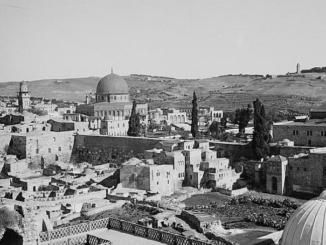
By Ramona Wadi
Speaking during a tour in Jerusalem organized by the Palestine Liberation Organisation’s (PLO) Negotiation Affairs Department, advisor to Palestinian Authority leader Mahmoud Abbas called on governments and international organizations to boycott the opening ceremonies pertaining to the US embassy relocation to Jerusalem.
Wafa news agency reported Nabil Shaath denouncing the embassy move as proof of the US administration’s “cooperation with Israel in sustaining its occupation” and claimed the only solution “must be based on international law and UN resolutions through establishing the State of Palestine along the 1967 borders and with East Jerusalem as its capital”.
Meanwhile, Abbas has continued appeasing Israel and the international community in Santiago, Chile, reiterating that “the Palestinian Authority is seeking negotiations based on international resolutions and a two-state solution along the 1967 borders,” according to the Palestine News Network.
The story that continues to be eliminated from official rhetoric is the fragmentation of Jerusalem in Israel, the PA, and international rhetoric. Following the announcement by US President Donald Trump that unilaterally recognized Jerusalem as Israel’s capital, the prevailing slogans across the world cited Jerusalem as the eternal capital of Palestine. Little thought was given as to how this truth has been diluted through years of diplomacy sustaining Israel’s settler-colonial expansion. Hence, the slogans only sustained a short-lived fervor – a temporary stance that soothed one’s conscience of having stood by Palestinians.
However, it is not only the constant bombardment of Israeli violations of Palestinian rights which cause the previous to lose tract, thus generating a fast-moving sequence that is prioritized according to how visible the violation is. The nature of international law and UN resolutions provides ample space for a struggle to be fragmented while violations expand their confines through normalization.
Likewise, the two-state paradigm is imbued with violence which the PA is endorsing. When Shaath and Abbas speak about East Jerusalem as Palestine’s capital, or “the legitimacy of two-states,” there is a tacit approval of accepting Israel’s colonial violence against Palestinians. The “eternal capital,” with reference to Jerusalem, implies a complete entity. Yet the two-state compromise insists upon a divided Jerusalem, which goes contrary to anti-colonial resistance. Israel’s rhetoric regarding the unification of Jerusalem, on the other hand, is a direct admission of colonial expansion and appropriation. One cannot help but ponder how many constructs of Jerusalem exist in the imaginary. Of the stories which the city could tell, which ones would reflect its essence and unity?
The PA and Israel, alongside the international community, have exposed their rhetoric as two sides of the same coin. West and East are the political conjectures which the international community, Israel, and the PA have agreed upon, away from the people’s aspirations. As politics manipulates Palestine’s definition of Jerusalem, it is incumbent on Palestinians and supporters of Palestine alike, to discern motives in language that seek to blur the boundaries between words and definitions.
Shaath and Abbas can voice their opposition to the US embassy move within the context of the two-state imposition – a stance that signifies acquiescence to the highest degree. It is thus the responsibility of all who dissociate themselves from PA maneuvers to define, from a Palestinian narrative, the meaning of Jerusalem as Palestine’s eternal capital.
– Ramona Wadi is a staff writer for Middle East Monitor, where this article was originally published. She contributed this article to PalestineChronicle.com.







